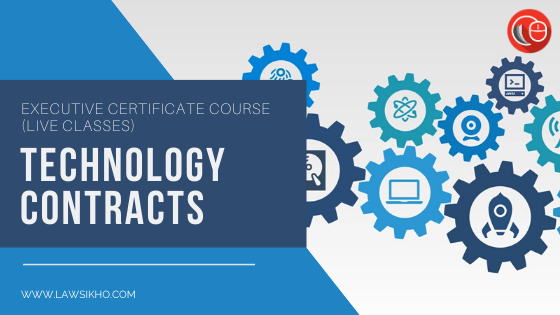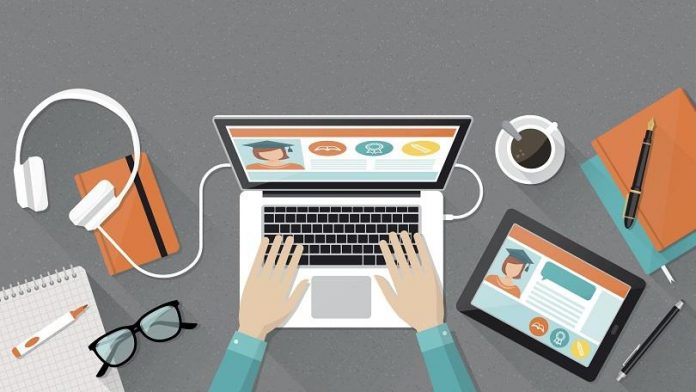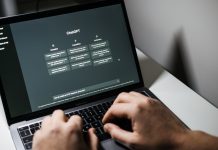This article is written by Ramanuj Mukherjee.
The K-12 education space in India has undergone a profound transformation in recent years as technology is now playing a central role thanks to social distancing. Even admission tests and final university tests had to go online. Higher education, test-prep, upskilling and professional education have not been far behind.
The Indian education sector is seeing an unprecedented albeit forced adoption of technology as of now. And the phenomenon is not limited to India.
Especially during the last few months, we are in the midst of an unprecedented digital revolution in education due to the ongoing lockdown and social distancing throughout the world.
Technology has helped to create a more connected workspace for teachers and a more collaborative and accessible environment for students. Many of us miss the warmth and energy of being on campus, but we are out of choices for now.
Surely, someday the campuses will open up again, but we are unlikely to stop using all the marvellous technology we have learnt to use in recent months.
Technology in education is here to stay, and online courses have found a whole new audience that was unimaginable a few months back.
Also, remember that schools and colleges will be the last to open. Social distancing is preferable and could be in place for years, potentially, because 5 months down the line coronavirus shows no sign of slowing down!
Educators and policymakers are increasingly focusing on digital learning because it has become a grave necessity at the moment, and a focus area for the future because of the boundless opportunities that technology-driven and online education represent.
Technology around education, as well as online courses, is exploding. And so are legal issues around EdTech and technology-enabled education.
We believe that in the near future, online education and EdTech will be a very significant sector, with many legal nuances and challenges of its own, and lawyers will be called to serve this sector in large numbers.
Why? How? When? What?
We will tell you about major noticeable trends and the legal work we expect around those trends.

Virtual classes
Virtual classes are at a nascent stage. There are many challenges. Are students who are logging in really attending the class? What happens to regulatory dictats, such as 70% attendance for law students issued by BCI?
Can schools and colleges mandate that video of each student at all times must be on? And that a face and action recognition system keeps track of whether students are really attending or playing on their mobiles?
Can regulators ask for such data which is in possession of colleges and schools to prove that classes are of an adequate quality, or that enough teachers are taking classes (UGC has alleged in the past that certain colleges show fake appointments to get approvals and teacher strength is often less than what is prescribed by the regulator), or that students are actually attending classes?
With recordings being available with the school, and regulators having an easy option to monitor everything, will school boards and bodies like UGC, AICTE, COA and BCI pass on the opportunity to regulate more effectively?
Other issues like cyber security, data protection and privacy would remain a concern.
What about students who find it hard to attend classes due to lack of bandwidth?
How are colleges planning to bridge the gap between the privilege of having a good wifi connection and a smartphone and for the ones who don’t enjoy these services?
There is a lot of advisory work for tech lawyers in the coming months. Education sector surely needs a helping hand who can guide them through this troubled water or they face very expensive and time taking litigation right at their door.
Smart institutions have already begun to hire lawyers and figure out these issues. Others will be reacting to adverse incidents and tragedies, but slowly but surely Indian education sector will wake up to the realities of online education and will have to seek legal help.
The biggest beneficiaries are likely to be lawyers who have good knowledge of tech law, tech contracts, and data privacy. And of course, we can expect some litigation on the cards as well, eventually.
SaaS solutions and legal issues
With no end in sight when it comes to social distancing, educational institutes are being forced to adopt SaaS software of various kinds at scale. It is not only a virtual classroom, but the entire administration of schools, colleges and universities have to go online suddenly and it would be possible only through SaaS software of various types.
And this means massive public procurement and a lot of government contracts when it comes to government organizations. Even at private institutions, contract drafting and negotiation services and legal advice will have to be sought for large contracts.
With a lot of fresh investment coming into this domain, we should expect a lot of M&A and investment law work involving edtech companies and online course providers.
These service providers will also generate a lot of advisory and drafting work for lawyers on all domains including contractual disputes, data protection principles, privacy issues and copyright & trademark infringement.
Online courses companies and online program managers
It is not just universities, colleges and schools, but there are thousands of courses being launched by hundreds of companies today, and many of them are very successful. Rise of companies like Byju’s, Great Learning, Upgrad, Vedantu, Toppr, Doubtnut and hundreds of others have shown us the massive potential of online education providers. It is decisively becoming a large sector in its own right.
There are also online program managers helping universities to launch online courses as well. This requires a lot of investment and consequently legal paperwork.
This sector needs lawyers just like any other companies, including in house counsels.
Dispute over fees and loans
How much should schools and colleges charge their students when courses are being conducted online? In reality, institutes are unable to drastically reduce their costs. They are still paying for most of the infrastructure, even if not for consumables like electricity. Most private institutes are also facing revenue pressure as new admissions dry up and many students are unable to pay their due fees. Technology does not come cheap either!
There is a possibility that the government may step in and provide fee waivers through promulgation in some cases.
However, as colleges try to recover fees to stay afloat while students demand deferral of fees is a grim reality for many institutions. Many of these institutions are also financed by banks and NBFCs, which further compounds their trouble.
Lawyers can definitely expect advisory and litigation related work on this front.
Online exams and proctoring
Online exams are mostly of two types. Take home open book tests or proctored online tests. In case of proctored tests, video of the candidate taking the exam is recorded, and any unusual behaviour can be flagged by either an automated process or by a human invigilator and recording of the exam is kept as evidence.
While the availability of audiovisual data makes for fewer disputes as any disputes over the exam process can be easily settled by factual assessment, at the same time many disputes may arise over handling of data, privacy issues, malware disrupting exams etc.
There is a great deal of dissatisfaction among students about systems being used for online exams and proctoring systems and there may be future disputes over handling of the exam, wrong invigilation, mishandling of data and failure to provide adequate infrastructure for taking an exam.
Many students who do not have access to the computer or smartphone or fast internet will feel discriminated against and may drag their institutions to the court for justice.
Online admission tests
Admission tests have been forced to go online. Some are adopting computer based exams through test centres, and rest for online proctored tests from home.
Admission tests have been highly litigated in India in the past, but with additional availability of video recordings, litigation may be more tenable in the time ahead as evidence will be available more readily.
Many admission tests are fraught with mismanagement, wrong questions, and terrible invigilation as test centres are usually outsourced. Any such instances in online admission tests will immediately lead to serious litigations due to the availability of video evidence.
Online teaching
Gone are the days when a teacher had to worry only about how the class will judge his or her delivery of a lesson. As the class will likely be recorded, and later can be reviewed by students, administration and possibly any random person on the web, even if a single student makes an unauthorised screengrab recording and circulates the same.
There are already unflattering videos of teachers floating around social media websites and it’s a matter of time till teachers are forced to take action against institutions, social media companies as well as students.
In the age of the cancel culture, it will definitely keep teachers on their toes anyway and can lead to many disputes, accusations, hearings and petitions in any case.
It is not only teachers who need to worry about this, the problem equally exists for students. Their unflattering videos can very well be circulated or misused, or used for bullying online by known or unknown people. Students could be young children, or even adults.
We can expect litigation and new regulation in these matters in the medium to long term. Lawyers are likely to see work related to content take down orders to social media websites, privacy policies, notices and litigation.
Online resources and study material
The notes that teachers give out are often from copyrighted books or journals. When such notes are given online, the possibility of wide circulation is much higher than mere photocopying. Can this lead to violation of copyright and institutional liabilities? Educational institutes definitely need to think about this issue.
A landmark case from the Delhi High Court allowed the photocopiers to keep selling notes from books as education was supposed to be affordable for all. Students will be studying and preparing for exams from pdfs or notes supplied by their teachers.
But what can happen when all of this goes online? Will book publishers have any protection at all? How will educational content producers monetize their work?
We can definitely expect a lot of litigation in the years ahead over protection of online course material.
Online assignments and feedback
It seems like it was a different time when assignments were to be copied and submitted to the teachers for internal evaluation. If anything, this year has shown us the importance of internal examinations where intermediate college students will be promoted on these marks.
In my opinion, the scrutiny on online assignments will increase. The Delhi University Open Book Examination shows us that the universities in India can take the route of Ivy Leagues where examinations do not give the final grade.
A researched and well-written article can also be graded for a final grade in the semester.
This will obviously increase the scholarship in the country but will bring issues like plagiarism and software like Turnitin that detects plagiarism in the limelight.
Legal issues like dispute in the plagiarism rate, copying of other students’ material could be the typical issues that the system may have to deal with.
However, there may be an increase in RTI requests for answer scripts and marking mechanisms, and plagiarism prosecution may see light of the day given that UGC has created a full fledged rule and a hearing system around plagiarism.
Lawyers can expect work related to academic offenses and students challenging the outcome of exams.
Online interaction with peers and faculty members
Every interaction between faculty, students and administration is now likely to be recorded as the same will take place over phones and online medium. From staff meetings to interactions between batchmates, everything will be online. A lot of things that could not be prosecuted in the past due to lack of evidence, would now be far easier to take up in the court of law.
For instance, discrimination based on gender or caste, or ageism or ableism in appointments or promotions, and everyday decision making at institutions could come under scanner. Availability of evidence means the victims or professional rivals can very well make good use of such evidence to discredit perpetrators and possibly initiate legal action.
Educational institutions could soon turn into a battleground with complaints and counter-complaints, and create a new area of work for lawyers.
Also, we will likely see the need to revise the employment contracts of staff of a college and school in light of massive shifts in the situation.
Online administration of institutions and courses
The biggest issue that can come up when it comes to online administration would be the softwares and the data that needs to be protected by every institution. The administration department has all the sensitive information regarding all the students, teachers and advisors of colleges. Issues like hacking or leakage of personal or private information would frequently arise.
Unauthorized entry into systems and even classes, and miscreants disrupting classes have become a major problem with online classes. There have been instances of hackers taking control of classes and showing porn to underage children. Keeping access details private is very hard as well as students willingly share details of their own classes with hackers on online chat rooms.
Furthermore, the regulators do not yet have any regulations on the systems that institutions offering online classes should be using and how institutions are expected to handle issues like data, privacy and cybersecurity.
Apart from data and privacy issues, cyber crime such as ransomware, phishing, hacking could be expected while institutions learn to adapt to the new situation.
Online student recruitment – marketing and sales
One of the biggest concerns of educational institutions is student recruitment. How are they going to find the students they need? The sales and marketing channels of the past remain completely disrupted. Only possible method for advertising, lead generation, marketing and sales is online.
This means the institution will likely deal with a large amount of data of leads. This is sensitive ground and again, good data practices would be very important. It is highly likely that those involved in sales and marketing may resort to bad data handling, buying of databases, spamming people who have not consented to receiving communications etc.
This is something that will keep many universities, schools and other institutions of education on toes. What kind of work may arise for lawyers? Definitely advisory and vetting of processes that have been set up. Eventually, we can expect regulatory action as well as individuals taking institutions to task for misusing their data
Online complaint redressal
Complaint redressal has often remained a challenge with most institutes. In case of higher education, UGC has set up a formal grievance redressal mechanism, mandatorily in each university, through the UGC (Grievance Redressal) Regulations of 2012. These regulations are not very well followed. However, as grievances are increasing due to disruption in the education system, there will be a lot more application of these rules in the times to come.
Definitely areas for lawyers to potentially work on.
Online disciplinary and penal processes
There are bound to be notorious activities by students in the classroom even if virtual. And there would always be complaints against teachers and staff as well. As disciplinary and penal processes go online, there will be less discretion with authorities and processes are likely to become a lot more formal.
There would be usual privacy and data safety concerns, of course. But there would be a lot of other work for lawyers too. They have to ensure proper processes are put into place, prepare or confirm various guidelines and codes of conduct issued by the universities and schools, and also assist those against whom disciplinary actions or other penal action is brought.
Some of these proceedings will likely be challenged in courts as well.
How can you prepare yourself to take full advantage of the legal work boom that is expected from the education sector?
You definitely need to upskill yourself on subjects like tech contracts, data privacy, cyber law to start with. At LawSikho, we are always ready to help you with that kind of upskilling.
Understanding all the regulations related to UGC and MHRD guidelines, as well as state specific rules (since state governments make their own rules and regulations as well) would be important.
Writing informative articles about these regulations can also be of great help, as very little information is available on the internet on these issues today and your writing would help you to stand out as someone working on these issues.
You can also start assisting some local colleges, schools and teachers and staff associations with pro bono advice, free webinars and newsletters. These things will go a long way in building relationships and awareness.
Here are some courses in which we are currently accepting enrollments:
DIPLOMA COURSES
Diploma in Advanced Contract Drafting, Negotiation and Dispute Resolution
Diploma in Cyber Law, FinTech Regulations and Technology Contracts
Diploma in M&A, Institutional Finance and Investment Laws (PE and VC transactions)
EXECUTIVE CERTIFICATE COURSES
Certificate Course in Capital Markets, Securities Laws, Insider Trading and SEBI Litigation
Certificate Course in Labour, Employment and Industrial Laws for HR Managers
LawSikho has created a telegram group for exchanging legal knowledge, referrals and various opportunities. You can click on this link and join:
 Serato DJ Crack 2025Serato DJ PRO Crack
Serato DJ Crack 2025Serato DJ PRO Crack










 Allow notifications
Allow notifications


